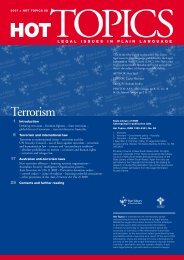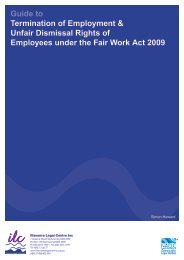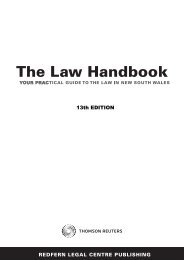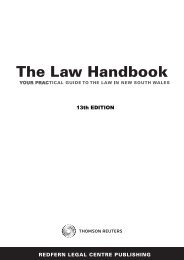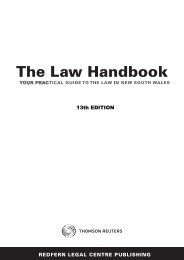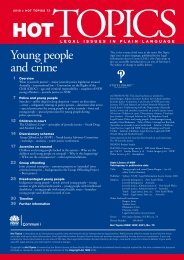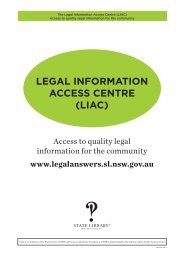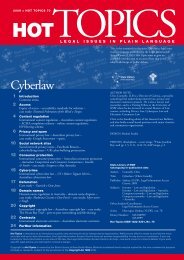Hot Topics - Issue 65: Human Rights - Legal Information Access ...
Hot Topics - Issue 65: Human Rights - Legal Information Access ...
Hot Topics - Issue 65: Human Rights - Legal Information Access ...
Create successful ePaper yourself
Turn your PDF publications into a flip-book with our unique Google optimized e-Paper software.
human <strong>Rights</strong> council complaint procedure<br />
A confidential complaints procedure from the now<br />
superseded Commission on <strong>Human</strong> <strong>Rights</strong>, referred<br />
to as the ‘1503 complaints procedure’, applied to gross<br />
violations of human rights or fundamental freedoms<br />
anywhere in the world. It could apply to a state regardless<br />
of whether it had ratified a relevant human rights treaty.<br />
It was adopted by the Commission on <strong>Human</strong> <strong>Rights</strong><br />
and named after the number of the Economic & Social<br />
Council Resolution that created it.<br />
The recently established <strong>Human</strong> <strong>Rights</strong> Council<br />
has agreed to continue its own version of the ‘1503’<br />
procedure.<br />
The new complaint procedure will address ‘consistent<br />
patterns of gross and reliably attested violations of all<br />
human rights and all fundamental freedoms occurring<br />
in any part of the world and in any circumstances’.<br />
Complaints are confidential – in fact, the new complaint<br />
procedure retains many features of the old 1503<br />
procedure. The complainant(s) must have direct or<br />
reliable knowledge (eg, victims, or a non-governmental<br />
organisation). The procedure does not lead to a direct<br />
remedy to the complainant(s), but is more systematic in<br />
its focus.<br />
treaty-based complaints<br />
Some human rights treaties allow countries to accept<br />
the right of an individual to complain to the treaty<br />
monitoring body that the country has not properly<br />
implemented its duties to protect particular human<br />
rights. This process is made possible by the treaty, or<br />
by a subsidiary treaty called an ‘optional protocol’. The<br />
complaints are usually referred to as ‘communications’.<br />
Treaties which allow for this process are:<br />
> the International Covenant on Civil and Political <strong>Rights</strong><br />
(ICCPR) (by becoming a party to its First Optional<br />
Protocol)<br />
> the Convention on the Elimination of All Forms of Racial<br />
Discrimination (CERD) (by making a declaration in<br />
accordance with Article 14)<br />
> the Convention against Torture (CAT) (by making a<br />
declaration in accordance with Article 22)<br />
> the Convention on the Elimination of All Forms of<br />
Discrimination against Women (CEDAW) (by<br />
becoming a party to its Optional Protocol)<br />
> the Convention on the Protection of the <strong>Rights</strong> of<br />
All Migrant Workers and Members of Their Families<br />
(CMW) (by making a declaration in accordance with<br />
Article 77)<br />
> the Convention on the <strong>Rights</strong> of Persons with Disabilities<br />
(by becoming a party to its Optional Protocol which<br />
is not yet in force)<br />
Australia has accepted an individual’s right under the first<br />
three of these treaties. In 2000, the Howard Government<br />
announced that it would not sign the Optional Protocol<br />
to CEDAW. The reasons for this are discussed further<br />
below. Note that the Rudd Government, elected in<br />
November 2007, announced in May 2008 that it intends<br />
to ratify the Optional Protocol to CEDAW noting that<br />
‘[t]he Rudd Government is committed to engaging with<br />
the international community in vigorously pursuing the<br />
promotion of women’s rights’.<br />
Making a communication<br />
An individual’s complaint under a treaty is called a<br />
‘communication’. Under the First Optional Protocol<br />
to the ICCPR, the communication is made to the<br />
<strong>Human</strong> <strong>Rights</strong> Committee (HRC) as the UN body<br />
with responsibility for monitoring that treaty. Similarly,<br />
a communication under CERD is made to the CERD<br />
Committee, under CAT to the CAT Committee, under<br />
CEDAW to the Committee on the Elimination of<br />
Discrimination Against Women and so on.<br />
There are usually two stages to a typical communication<br />
procedure to a treaty body or committee. We will<br />
assume that the state the subject of the complaint is<br />
Australia. After the complaint is received – it must<br />
be in writing and may not be anonymous – the treaty<br />
body first decides whether it is ‘admissible’ (whether it<br />
satisfies a range of technical requirements). For example,<br />
the person making the complaint must have exhausted<br />
all available domestic remedies in Australian law for<br />
the alleged infringement of rights. In other words, a<br />
complainant must have pursued every possible legal<br />
avenue for redress, including appealing adverse decisions<br />
up to the highest court possible. In reality, this may not<br />
be a very demanding requirement in many human rights<br />
cases in Australia, because our legal system provides<br />
relatively few remedies for breaches of human rights.<br />
If the complaint is admissible, the treaty body then<br />
considers the merits or the substance of the case, and<br />
decides if the particular activity or inactivity complained<br />
of breaches one of the rights set out in the relevant<br />
treaty. The decision of the treaty body is expressed as the<br />
‘views’ which it has ‘adopted’.<br />
the effectiveness of communications<br />
The right of individual petition in international law<br />
is by no means a cure for human rights violations.<br />
First, it takes a very long time for a treaty body to<br />
make a finding (for instance, the average time for the<br />
<strong>Human</strong> <strong>Rights</strong> Committee is four years). Second, the<br />
treaty body’s adoption of views on the substance of a<br />
particular case is not strictly binding on the country<br />
concerned. The Committee’s views are simply forwarded<br />
to both the country and individual involved and are<br />
published in its annual report to the General Assembly<br />
Modern human rights law 13



